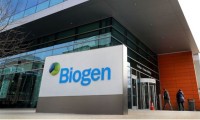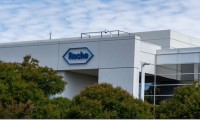-
After launch limitations, Johnson & Johnson exec touts manufacturing progress on CAR-T drug Carvykti
- Source: drugdu
- 111
- October 20, 2023
-
Biogen Lays Off 113 Reata Employees Weeks After Completing $7B Acquisition
- Source: drugdu
- 226
- October 14, 2023
-
Roche’s Subcutaneous Ocrevus Rivals IV Formulation in Phase III MS Trial
- Source: drugdu
- 117
- October 13, 2023
-
Already Partnered With Nvidia and Eli Lilly, Iambic Adds $100M for AI Drug Discovery
- Source: drugdu
- 227
- October 6, 2023
-
Once a Blockbuster Prospect, Is Travere’s Kidney Drug on Track to Become a Bust?
- Source: drugdu
- 161
- October 3, 2023
-
Genentech, PeptiDream Ink Potential $1B Radiopharma Deal
- Source: drugdu
- 118
- September 30, 2023
-
Will Big Pharma engage in Medicare price negotiations? AZ, BMS say they will
- Source: drugdu
- 106
- September 29, 2023
-
Anthos Stops Mid-Stage Atrial Fibrillation Trial Due to ‘Unprecedented’ Efficacy
- Source: drugdu
- 96
- September 20, 2023
-
BMS Culls Two Mid-Stage, Four Early-Stage Clinical Programs
- Source: drugdu
- 205
- September 16, 2023
-
CancerVAX joins forces with UCLA to develop a universal CAR-T cell therapy
- Source: drugdu
- 152
- September 14, 2023
your submission has already been received.
OK
Subscribe
Please enter a valid Email address!
Submit
The most relevant industry news & insight will be sent to you every two weeks.













